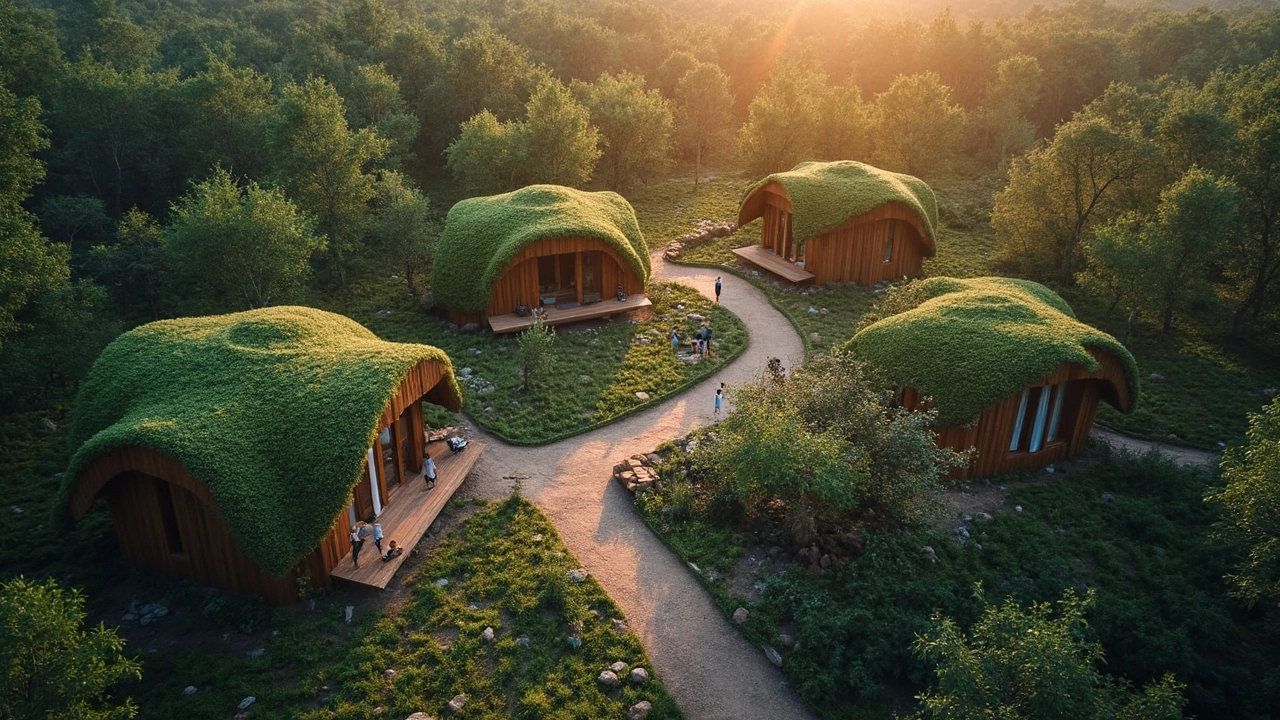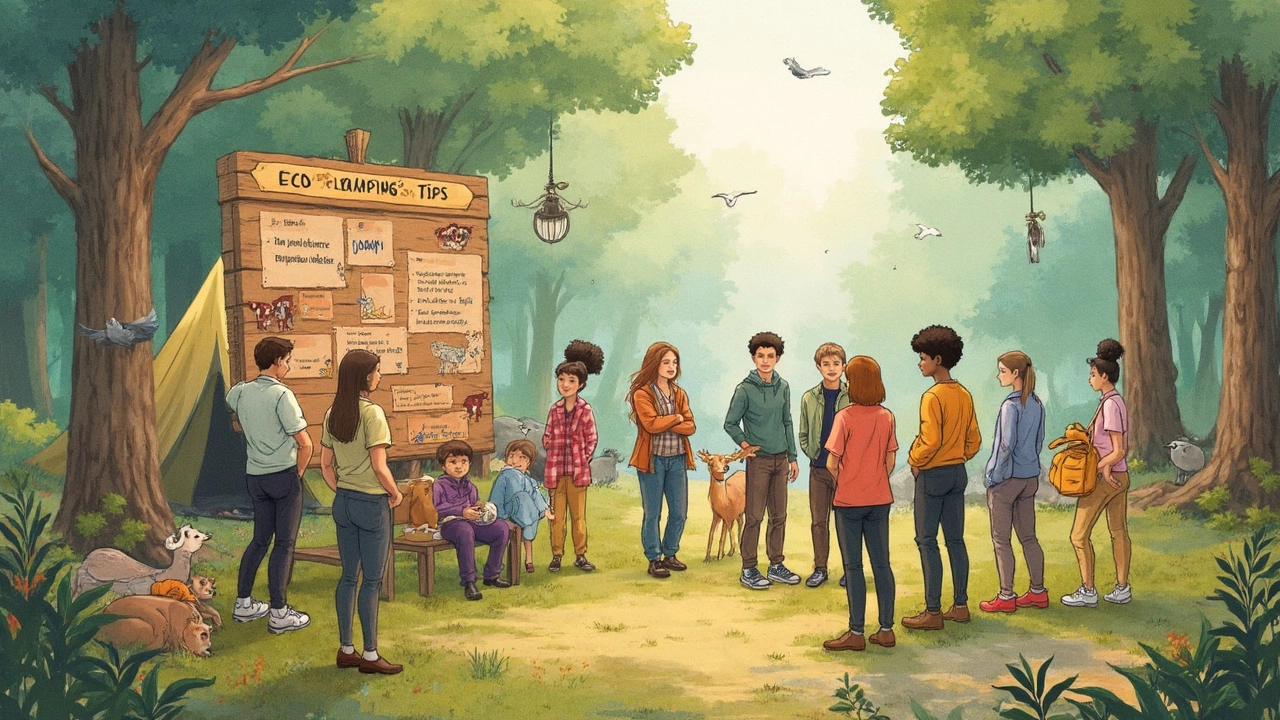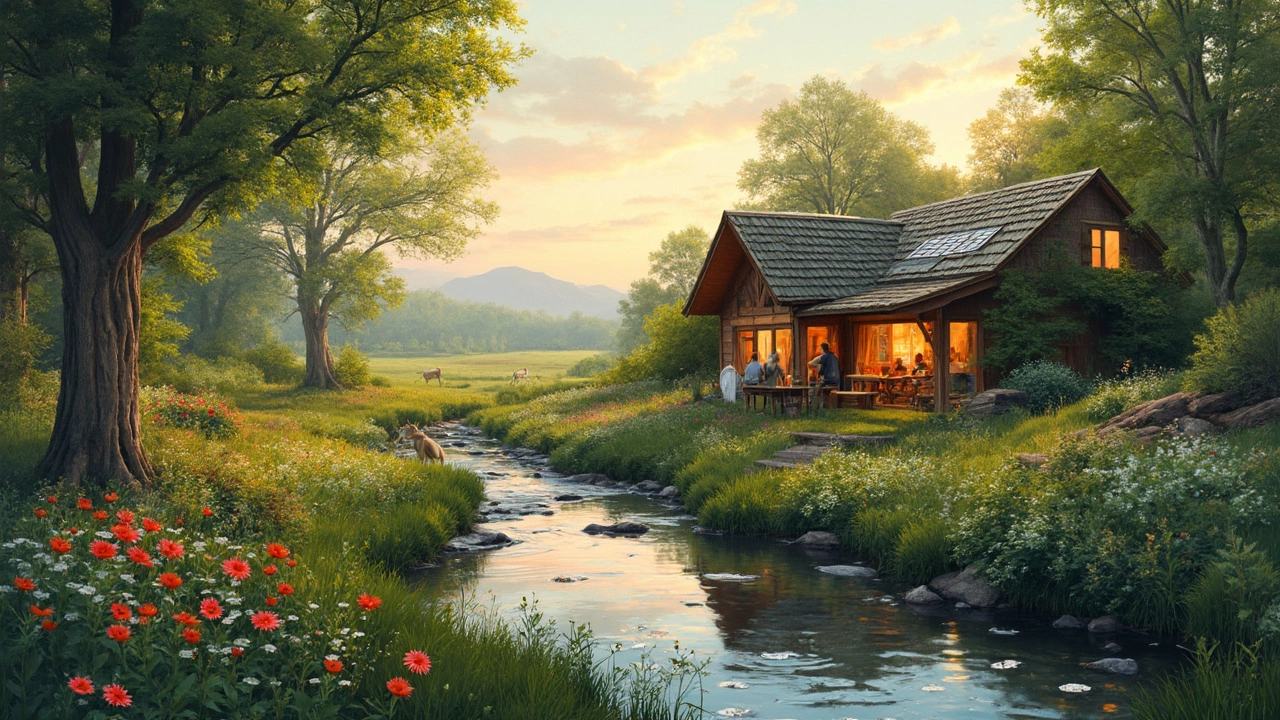The Golden Rule of Camping: Eco-Friendly Cottages
29 Mar, 2025Ever thought about kicking back in nature while keeping Mother Earth happy? With eco-friendly cottages, it's totally doable. Imagine enjoying the serene beauty around you without worrying about leaving a footprint. That's where the golden rule of camping comes in: leave no trace. Simple, right? It's all about taking memories and leaving nothing but tiny footprints.
Picture this: a cozy cabin nestled in the woods, running off solar energy. You're sipping your coffee, knowing that every sip doesn't inch the planet closer to doom. Managing resources smartly makes all the difference. Use water wisely, turn off those unnecessary lights, and yes, maybe skip the super long showers. Little steps, big impact, you know what I mean?
- Why Eco-Friendly Cottages Matter
- Conserving Resources
- Minimizing Waste
- Respecting Wildlife
- Practical Tips for Green Camping
Why Eco-Friendly Cottages Matter
Camping in eco-friendly cottages is more than just a trend; it's about making a difference. When you stay in these cottages, you help reduce the environmental impact usually associated with camping. Traditional campsites can sometimes harm the environment with waste production and resource usage, but eco-friendly options aim to change that.
These cottages are designed to work harmoniously with nature. Many rely on renewable energy sources like solar panels. This means you enjoy the convenience without the guilt. It's not just about conserving resources for ourselves but ensuring they're there for future campers too. Statistics show that sustainable practices in camping can cut energy consumption by up to 50%.
Another reason these cottages matter is waste management. They encourage reducing, reusing, and recycling. Effective waste management systems mean less trash in landfills and more materials being recycled. So, if you're in one of these spots, look for composting toilets or recycling bins. It might seem small, but it makes a big difference.
One awesome thing about eco-friendly spots is their commitment to being wildlife-friendly. Traditional camping can be intrusive to local wildlife, but these cottages act as a barrier, allowing you to enjoy nature without harming it. They’re often built using materials that blend into the surroundings, so animals aren’t disturbed.
Conserving Resources
When you're chilling in eco-friendly cottages, conserving resources isn't just a nice idea—it's kind of the whole point. These cottages often rely on limited supplies like solar energy and collected rainwater, so being mindful is key. It’s like practicing that old 'waste not, want not' vibe.
First off, let's talk water. Seriously, we kind of take it for granted. Now, while you’re camping, keep those showers short and don't let the tap run. It might feel like an inconvenience, but it's a big help for the environment. Installing timed shower heads is a game changer, as one study showed they can cut down water use by up to 50%.
“The greatest threat to our planet is the belief that someone else will save it.” — Robert Swan
Same goes for energy. The sun’s doing most of the work in eco-friendly spots. Make sure you're turning off lights and unplugging devices when you're not using them. A small act like switching to LED lights can save up to 75% in energy!
- Use rechargeable batteries for your gear.
- Opt for solar-powered chargers. They're quiet, and don't waste gas like those noisy generators.
- Bring along some solar-powered lights; they’re perfect for a gentle glow come nightfall.
When everyone chips in, we make a big impact with little effort. Plus, it feels good to know you're doing your part. By conserving resources, you’re making sure those who come after you can enjoy the same outdoor magic.

Minimizing Waste
Alright, let’s talk about minimizing waste, because who wants to camp surrounded by a bunch of garbage? Not me, and I bet not you either. One of the best things you can do when staying in eco-friendly cottages is to pack smart. That means bringing reusable items like water bottles, utensils, and shopping bags. Less single-use stuff means less trash. Pretty straightforward, right?
Food waste is another biggie. It’s a bummer to chuck out uneaten food, so try planning meals ahead of time. Think about getting food in bulk to reduce packaging, and consider making a compost pile for scraps if your cottage setup allows.
Cleaning up also means recycling right. Make sure you know which bins are for what. Most places should give you the lowdown on where to toss your plastics and cans. If they don’t, ask! It shows you care about keeping the place tidy and green.
Check out this neat little stat: Proper waste have led to a reduction in overall trash by up to 50% in certain campgrounds. That’s huge! Imagine if we all did our bit—the impact would be massive.
- Bring reusable bottles and utensils.
- Plan meals to avoid waste.
- Recycle and compost whenever possible.
- Avoid single-use products like plastic cutlery and straws.
By keeping these tips in mind, you’re not just minimizing waste—you’re creating a cleaner, happier camping experience for everyone. And hey, your kids, like Tristan, will appreciate learning by example when it comes to taking care of the planet!
Respecting Wildlife
Alright, so you're out there, soaking in the great outdoors. But it's not just your playground; it's home for a lot of critters. Ensuring our wild neighbors stay safe and happy is a big part of the golden rule of camping. So, what's the game plan? Start by keeping a respectful distance from any wildlife you encounter. Getting too close can stress animals out and even disturb their natural behaviors.
Think of it like visiting someone's house. You wouldn't barge in and move their stuff around, right? Same goes with campsites. Stick to designated trails and campsites to avoid trampling on habitats. And resist the urge to feed wildlife. It might seem harmless, but feeding animals can lead to dependency on humans and cause them serious harm in the long run.
Have you heard of the Leave No Trace principles? They’re spot-on guidelines for respecting wildlife. Here's a quick rundown:
- Plan ahead and prepare: Know the local wildlife and their habits before you head out.
- Travel and camp on durable surfaces: Avoid disrupting fragile ecosystems.
- Dispose of waste properly: Pack it in, pack it out. Trash has no place in nature.
- Leave what you find: Keep your souvenirs in memory form, not physical ones.
- Be considerate of other visitors: Share the space with both wildlife and people.
In 2023, there were reports from several national parks showing a 30% increase in wildlife disturbances due to inexperienced campers (source: National Park Service). Yikes! So, respecting wildlife isn’t just good manners—it's crucial for their survival. By following these steps, you're not just following the golden rule, you’re being a true nature ally.

Practical Tips for Green Camping
Alright, so you're ready to dive into the world of camping with an eco-friendly twist. Good on you! Let's talk about some ways to make that happen effectively. First off, consider picking an eco-friendly cottage, preferably one that's designed with sustainability in mind. Look for features like solar panels, rainwater harvesting systems, and composting toilets. It's all about living with the land, not off it.
Next, manage your resources wisely. We all love our creature comforts, but try to limit the use of electricity. Relying on natural light and heat is not only smart but also super satisfying. When it comes to water, short showers and turning off the tap while brushing your teeth can save gallons. Simple, but it makes a difference.
Now, let's chat about waste management. Bring along trash bags so you can pack out whatever you pack in. And hey, give recycling a shot too. Most places have recycling bins, so be sure to use them. Also, consider using biodegradable soap for washing dishes or yourself. It's friendly for the environment and keeps our campsites clean.
- Pack Reusable Items: Opt for reusable utensils, plates, and cups. It cuts down on trash significantly.
- Tread Lightly: Stick to marked trails and campsites. It protects the natural habitat and ensures wildlife stays undisturbed.
- Wildlife Respect: Keep your distance from animals. Feeding them or getting too close can disrupt their natural behavior and make them dependent on human interaction.
Thinking about the environment isn’t just trendy; it's being responsible. And when you're out there, it's not only about following rules but feeling good about giving back to nature. So go on, enjoy your camping adventure in an eco-friendly way. You'll thank yourself later (and so will the planet).

 by
by